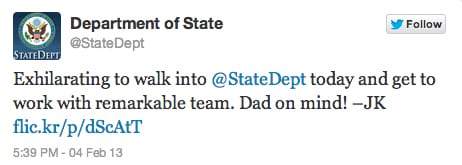The Discussion of Internet Freedom Takes Center Stage in 2013
By Amelie Barratt
John Kerry’s first official tweet as the new Secretary of State will be interesting to keep in mind as we watch him navigate the Internet in his new role. Although Hillary Clinton did not tweet while holding the position, she is recognized for drastically enhancing the State Department’s commitment to outreach and public diplomacy in particular.
The ability to reach millions through social media makes Internet freedom a top priority for the United States, seen not only as a desirable policy, but as an extension of basic human rights. The Bureau of Democracy, Human Rights, and Labor within the U.S. Department of State defines it specifically as “an aspect of the universal rights of freedom of expression and the free flow of information.”
Today and tomorrow, the State Department is hosting Tech@State, a convention with its theme this year focusing on the use of technology to enhance and expand Internet freedom. The event, held at the George Washington University in Washington DC, will consist of panel discussions among key thinkers in the realm of Internet and how its freedom can enhance diplomacy worldwide.
Also of note is the upcoming Fifth World Telecommunication/ICT Policy Forum organized by the United Nations’ International Telecommunication Union (ITU). The three-day event from May 14 to 16, which will take place in Geneva, Switzerland, will create an environment where experts and policy makers can “exchange views on the key policy issues arising from today’s fast changing information and communication technology (ICT) environment.” Some hesitation among Internet freedom activists surrounds the event as many countries requested international regulation on Internet use at the 2012 World Conference on International Telecommunications (WCIT), held in Dubai, UAE, leaving activists worried that regulatory measures could lead to government overreach.
With all these events lined up in the near future one can’t help but ask who exactly the audience is. Are policymakers truly the top tier and the only ones in need of inclusion? How could public, and more specifically, cultural diplomacy enhance these events? Cultural programs and student exchanges in the past have proven to be very effective in bridging gaps where nations are at odds, bringing publics together to work towards a common goal, in this case, Internet freedom. Perhaps this issue could use some help from public and cultural diplomacy practitioners to win the hearts and minds of those in need of convincing of the possibly great outcomes of Internet freedom.
The recently proposed Global Internet Freedom Act by Rep. Zoe Lofgren is interesting to take into account which would operate as a task force, monitoring “both the U.S. and other countries that deny market access to Internet goods and services or threaten the technical operation, security and free flow of communications on the Internet.” And although not specifically mentioned, conferences such as the WCIT would be among the types of events monitored by this proposed legislation.
Internet freedom is clearly a discussion that is recognized among many states but still remains a topic in need of much advancement. The overarching question of whether or not government should be involved in regulating the use of Internet seems to cause a visible divide between nations who perceive this freedom as a threat and those who associate it with positive growth. 2013 will be the year to watch as the discussion on Internet use continues on all levels.
Amelie Barratt is a graduate student at the George Washington University where she is working towards her degree in Global Communication with a focus on Public Diplomacy. She currently works at the U.S Department of State in the Office of Children’s Issues.
The above post is from Take Five’s new Student Perspective series. Graduate students studying Cultural Diplomacy as Communication at the George Washington University are encouraged to think about themes such as youth, gender, health, climate, free press, and democracy, and write on how these themes relate to cultural diplomacy and to communication. The posts involve thoughtful commentary on the writer’s chosen theme, linking to class readings and discussions.




2 thoughts on “The Discussion of Internet Freedom Takes Center Stage in 2013”
Reblogged this on On Politics and Language.